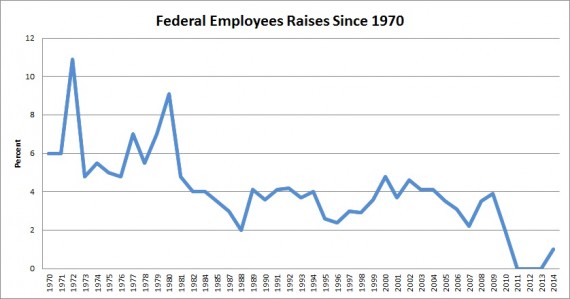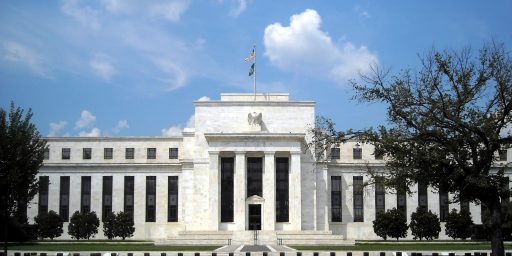Has Government Worker Pay Been Shrinking?
Eric Katz of Government Executive points to "The Incredible Shrinking Pay Raise in One Chart."
Eric Katz of Government Executive points to “The Incredible Shrinking Pay Raise in One Chart.”
Earlier this week, President Obama announced that he will propose a 1 percent raise for federal employees in 2015.
If adopted by Congress, the raise would mark the second consecutive 1 percent increase after three years of frozen pay. Federal employee groups were not impressed, calling the proposal “pitiful,” “inadequate” and “bittersweet.”
Turns out the groups may have a point, at least from a historical perspective.
Here’s the chart:
That’s the entirety of Katz’ analysis. Regular readers know what comes next. The chart without a doubt shows a shrinking pay raise. But . . . so what? What’s interesting is how each year’s pay compares to the cost of living. I’m not going to go through the effort of compiling a 1970 to 2014 inflation graph and then plotting the federal pay raise data against it. But here’s a chart with the CPI since 1957:
You’ll notice that the peaks and valleys roughly correspond to the federal pay raises. Raises were very high in the 1970s and early 1980s because of sky-high inflation; they’ve been much lower since because there’s been next to no inflation. Owing to the Great Recession, we actually had negative inflation in 2009. Federal employees nonetheless got a pay raise in 2010.
Now, President Obama ordered and Congress went along with a pay freeze for 2011, 2012, and 2013. Given inflation rates of 3.2, 2.1, and 1.5 those years, that amounted to a real cut in pay. And, of course, 2013 was also the year of sequester-mandated furloughs. While those came with additional time off, those, too, amounted to pay cuts. But the chart really doesn’t tell that story.
For that matter, inflation isn’t the only thing to which federal civil service pay (which is actually what the graph looks at) could usefully be compared. If Congress were giving itself pay increases while not giving it to the civil service, that would be interesting. Similarly, if Congress was giving hefty pay hikes to the uniformed military—and it was—during the same period as it was freezing civil service wages, that’s interesting. Indeed, military pay has gone up at a much higher rate than civil service pay for years, such that Defense Department employees doing the same job and holding equivalent rank are taking home wildly different pay checks. For that matter, it would be interesting, if difficult, to compare civil service pay with equivalent private sector compensation over the same period.
But simply graphing pay raises over time with no context? Not the least bit interesting.








Don’t forget that new employees just had the pension contribution upped by 450% with no increase in benefits (indeed the only bills on retirement circulating in Congress are to cut benefits).
Don’t forget that federal employees get a step increase every 2 or 3 years until they top out at their grade.
@Keith Humphreys: That’s true. I’m in the middle of that—hired before the latest increase but after the previous one. It doesn’t strike me as unreasonable, given that our pension benefits are still generous compared to those in the private sector. But, again, it’s something the chart doesn’t show.
@DC Loser: Also true. Of course, that was true during the period of high COLA increases, too.
now overlay whats been going on in the private sector.
@Eric Florack: I note that in the piece. But I’m not sure exactly what has been going on in the equivalent private sector. The civil service has an outsized contingent of educated professionals–people with professional, graduate, and STEM degrees that are in high demand or at least tend to pay well for those lucky enough to land jobs.
Keep in mind too that the federal government now employs about 2% of the employed population. In ’66 it was more than twice that…4.3%. So you can only presume that they are working harder.
The real issue isn’t what Federal workers are being paid.
It’s that we have shed a net 2M public sector jobs. Replace those and you are looking at a UE rate in the high 4’s or low 5’s.
The deficit is now equal to that which W. left behind…so public sector spending is significantly reduced as well. I’ve been waiting to hear from all of you who said eliminating some of the Bush Tax Cuts on the wealthy was going to destroy the economy and throw us into a double dip recession.
well, it’s a free country, look elsewhere if it’s so tough. i’d hate to see them have to buy domestic wines and shop at lessor stores……what a pity.
Compare that with the contractor workforce. With the wave of contracting cuts, I know contractors who support the military and IC who have taken 40% pay cuts to keep their jobs.
I couldn’t quite adjust “raises” to “inflation” by eye, so I went and found some charts of pay and total compensation over time. They are at Cato, but if they are not lying then no, federal wages have not fallen in real terms or benefits at all.
(Ignoring the hyperbole on that site, completely)
OK … there was a down-tick at the end, but only a tick.
New internet-wide policy: no one is allowed to label anything “in one chart”. It’s an even stronger predictor than “you won’t believe what happened next” that it’s going to be something stupid.
@Pinky:
Hey, at least it isn’t 20 surprising facts (with slideshow).
@john personna: 😉
@James Joyner:
An increase in your contribution is, quite simply, a pay cut by another name. Why does that seem reasonable?
Are you doing less work? Is it not enough money to care about? Are you simply grateful to have a job at all? Have you begun stealing office supplies to make up the difference?
I’m genuinely curious as to why a worker would view a pay cut as reasonable.
@Gustopher: It wasn’t a pay cut to me–it was the baseline offering. It’s only a cut if you were getting it previously. And, while federal civil service retirement sucks now compared to the very old days, it’s quite good compared to private sector retirement.
I have little sympathy for public sector union employees who complain about their salary and benefit compensation – usually such compensation is very good, particularly the benefit package.
Since the 2008 financial collapse I have worked in 2 organizations where automatic COLA adjustments are non-existent, and where any salary increases or one-time-incentive pay bonuses are based completely on individual and organization goals.
@al-Ameda: Well, congratulations. You fell completely for the Republican BS and now you can help carry out their war against pensions.
The answer to “some government workers still have decent retirement plans when mine has been stolen” is not “take it away from them.” It’s “give it back to me.”
But Americans act like poor whites in the plantation South. The rich men steal all their money, and when they complain they say “look how good those ni@@ers have it. They’re your real enemy.”
And the American people fall for it time and again. Yes, we should beggar government workers because your employers decided to steal their workers pensions and keep the money for themselves.
I’m about halfway between al-ameda and wr on this stuff. I agree with wr about private sector looting of people’s pensions, and the poison of the mentality that accepts half a loaf so long as your neighbor gets nothing.
However, some governmental units (local & state level, typically) really have made what are essentially dishonest promises to their employees and when the bill comes due it’s a problem. The solution is to spread the pain (some tax increases, some benefit cuts), IMO, and learn from it. Don’t promise public employees the moon in deferred compensation. Pay ’em now with revenue you actually have rather than later with magic pixie dust.
It’s past time to force more businesses and governments alike to properly fund their retirement promises, or not make the damned promises in the first place.
[theoretically, I am due a pension some day. I have less faith in that than I have in receiving my full social security benefits. First, because there’s been enough looting of people’s pensions to show a pattern, and second b/c SS is run by the feds who control a currency and do not operate under a balanced budget requirement]
I’m way over or left of wr. One way out of this debt ditch is to get back to normal levels of inflation. It’d get a bit of a kick if the broken promises were backstopped at the federal level. It’s also the right thing to do for people who through no fault of their own lost their retirement bennies.
When comparing Gov’t to private, be careful of which private companies you compare; there is a difference between Gov’t contractors (who are typically less compensated than the equivalent gov’t employee) and non-Gov’t contracting professionals.
I am a gov’t contractor, and haven’t received a raise since 2010; which, since inflation is greater than zero, means my real wages have been dropping. But it’s not because my employer doesn’t want to give me a raise — we work for the gov’t, and they effectively won’t let her. (I’m simplifying, yes …).
Unfortunately, there’s a maxim in this industry that seems to be true: once you work for the gov’t you can’t leave.
@John D’Geek:
So basically just like the federal workforce. 3 years of pay freeze followed by 2 of 1% raises vs. 4 years of pay freeze. Very close.
That sucks, and I sympathize. That’s a real pay cut of… 6.78%, according to the CPI inflation calculator. Ouch. I’d be unhappy with that, fer sure.
@al-Ameda: Public sector compensation for STEM folks is usually decent, but below what you could get elsewhere. Some of the other well-educated careers are a bit harder to measure because there aren’t as many equivalent jobs in both public and private (how many private teachers are there, compared to public, for instance?).
And COLA adjustments are based on understating the inflation rate, with the replacements in the basket of goods used to calculate it (steak is expensive? people will switch to ground beef… and now we have negative inflation!).
But, if you’re not getting raises to keep your private salary from being eroded, you may be better off looking for your next job. I know that almost all my salary increases have been from switching jobs (not sure why my employers have always incentivized job hopping, seems shortsighted to me…)
@DC Loser:
…which means they now make about what their government counterparts do.
That’s always been the trade — with the government, you make a lot less but have much greater job security. (You used to get a more secure retirement, too, but now it’s just a mediocre 401k.) Private pays a lot more, but is much more fickle.
I’ve been a .com, a .edu, a .gov, and a .org — I’ve had a chance to compare first-hand. For a given level of ability and experience, the federal government pays too much at the bottom end and not nearly enough at the high end.
@ Eric Florack
That’s simple. The private sector has been screwing it’s workers so that CEO’s can get multi-million dollar bonuses and have an annual income that far exceeds a workers lifetime income.
@DrDaveT:
I can tell that you are old(*). The kids these days are all .io
* – probably just my cohort
@wr: sure, al-ameda is a closet conservative now!
speaking of elephants in the room- i noticed that doug is mia again?
@DrDaveT:
Actually most contrators make less than governmnet employees since the government has contracted out the low paying jobs. There are few contractors that are paid at the level of GS-14 or GS-15s.
@superdestroyer:
While it doesn’t feel like in here in the National Capitol Region, there are very few GS-14s and GS-15s. And those are senior supervisory positions. Contractors are precluded by law from being in decision-making positions. At least de jure. De facto is another matter.
@DrDaveT:
Thanks for your post – I’ve also spent significant time in the various dot-worlds, and I think you’ve identified a central point of contention in the compensation/security vortex between public and private.
Private-sector purists are very quick to demand private-sector job security when times are tight, but molasses-like on providing private-sector pay when times are flush. This mirrors a pointed contempt for public-sector professionals whilst demanding top-grade services.
Personally, I’ve found an organization’s prowess is much more affected by the organization’s size (and quality of senior professionalism) than whether it’s public or private.
@wr:
I wasn’t aware that I suggested that American workers should have sh*tty pay and lousy retirement benefits.
@James Joyner:
According to http://www.examiner.com/article/number-of-highly-paid-federal-employees-increasing-rapidly
.
There are over 60K GS-15. There are n0 where that many of contractors who make at the same level. It is a useful meme that contractors make a lot of money but many contractors are just people who never got into the civil service to begin with.
@superdestroyer: But that’s out of a workforce of well over 2 million.
@superdestroyer:
So do most burger-flippers. You’re changing the subject.
The question is not “what does the average contractor make, compared to the average fed?”. The question is “what would the average fed make if she did the same work for a private contractor?”.
The answer for IT support, HR flunkies, and secretaries is “A private contract would not employ this person for long.” The answer for skilled professionals with advanced degrees is “A lot more than she does now — until she gets downsized.”